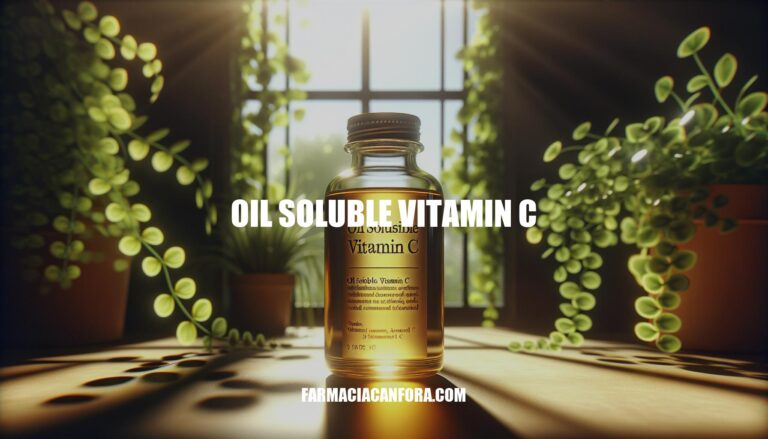


Oil-soluble vitamin C, such as tetrahexyldecyl ascorbate, is a stable form of vitamin C that dissolves in oils rather than water. This stability allows it to penetrate the skin more effectively, making it ideal for skincare products. Unlike water-soluble forms, oil-soluble vitamin C is less likely to oxidize, ensuring longer-lasting benefits like improved collagen production and reduced hyperpigmentation.
Oil-soluble vitamin C, such as tetrahexyldecyl ascorbate and ascorbyl tetraisopalmitate, is a derivative of ascorbic acid. These forms are created by esterifying ascorbic acid with fatty acids, making them lipid-soluble.
Chemical Structure:
Stability:
Solubility:
These properties make oil-soluble vitamin C derivatives highly effective in skincare formulations, providing enhanced stability and deeper skin penetration.
Here are the specific benefits of oil-soluble vitamin C for the skin:
Enhanced Absorption: Oil-soluble vitamin C, such as tetrahexyldecyl ascorbate, penetrates the skin more effectively due to its lipid-soluble nature, allowing it to reach deeper layers.
Reduced Irritation: This form of vitamin C is less acidic and more stable than water-soluble forms like L-ascorbic acid, making it gentler on the skin and less likely to cause irritation.
Improved Collagen Production: It stimulates collagen synthesis, which helps to maintain skin elasticity and reduce the appearance of fine lines and wrinkles.
These benefits make oil-soluble vitamin C a great option for those looking to enhance their skincare routine.
Oil-soluble vitamin C, particularly in the form of tetrahexyldecyl ascorbate, is widely used in skincare products like serums, creams, and lotions. Here’s why:
Stability: Unlike water-soluble forms, oil-soluble vitamin C is more stable and less prone to oxidation, which means it maintains its efficacy longer.
Penetration: Its lipid-soluble nature allows it to penetrate deeper into the skin layers, enhancing its effectiveness in delivering benefits such as collagen production and reducing hyperpigmentation.
Compatibility: It can be easily incorporated into oil-based formulations, making it versatile for various product types. This compatibility also means it can be combined with other beneficial ingredients like retinol and vitamin E.
Gentleness: Oil-soluble vitamin C is generally less irritating compared to its water-soluble counterparts, making it suitable for sensitive skin.
These properties make oil-soluble vitamin C a popular choice in skincare formulations aimed at anti-aging, brightening, and overall skin health.
Efficacy:
Stability:
User Experience:
Here are some key scientific studies that highlight the effectiveness and benefits of oil-soluble vitamin C:
Tetrahexyldecyl Ascorbate: This oil-soluble form of vitamin C is more stable and less irritating than traditional L-ascorbic acid. Studies suggest it penetrates the skin better due to its fatty acid composition, helping to improve hyperpigmentation, minimize signs of aging, and support collagen production.
Clinical Efficacy of Topical Vitamin C: Research indicates that topical application of vitamin C, including its oil-soluble derivatives, protects the skin from free radicals, stimulates collagen production, and reduces hyperpigmentation. This is particularly beneficial as oral consumption of vitamin C has limited bioavailability.
Antioxidant Properties: Vitamin C’s antioxidant activity helps limit the damaging effects of free radicals, potentially preventing or delaying the development of certain cancers, cardiovascular diseases, and other conditions linked to oxidative stress.
These studies collectively support the effectiveness of oil-soluble vitamin C in skincare, highlighting its stability, skin penetration, and broad range of benefits.
Oil-soluble vitamin C is a stable form of vitamin C that dissolves in oils rather than water, making it ideal for skincare products. Its stability allows it to penetrate the skin more effectively and resist oxidation, ensuring longer-lasting benefits like improved collagen production and reduced hyperpigmentation.
Oil-soluble vitamin C derivatives, such as tetrahexyldecyl ascorbate and ascorbyl tetraisopalmitate, are created by esterifying ascorbic acid with fatty acids, making them lipid-soluble. These forms are more stable than pure ascorbic acid, especially in formulations exposed to air and light, and can easily dissolve in oils, allowing for better penetration into the skin compared to water-soluble forms.
The benefits of oil-soluble vitamin C include enhanced absorption, reduced irritation, and improved collagen production, making it a great option for those looking to enhance their skincare routine. Its stability, penetration, compatibility, and gentleness make it a popular choice in skincare formulations aimed at anti-aging, brightening, and overall skin health.